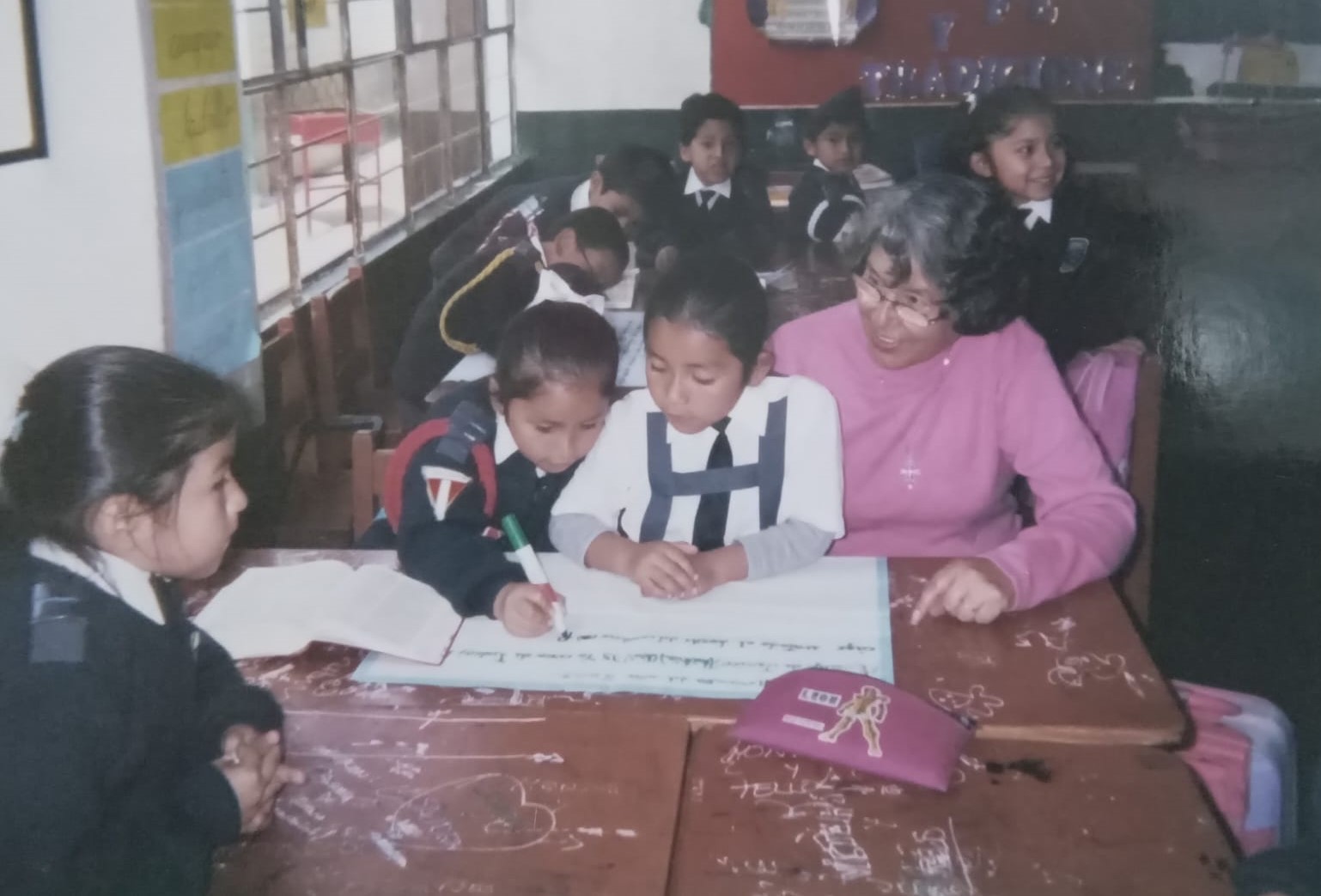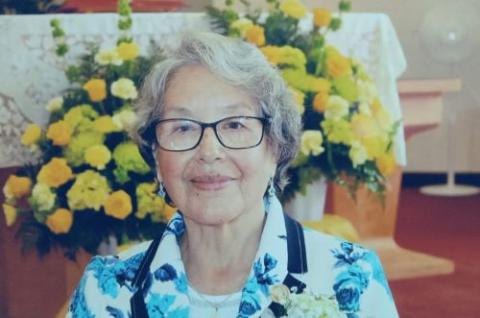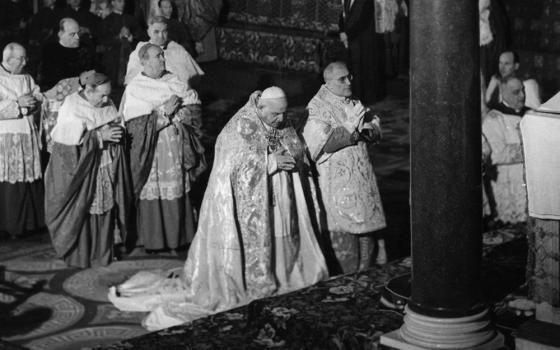
Franciscan Sr. Cristina Florez Gonzalez, right, works with children of Peruvian Air Force members in the Surco District of Lima, Peru, May 8, 2005. (Photo courtesy of Cristina Florez Gonzalez)
Peru is in agony.
The country has had six presidents in the last five years, many of whom now face criminal charges. The political turmoil has left violent protests in its wake. Additionally, rains from El Niño have battered Peru, causing flooding that has left many Peruvians homeless and has led to the most extensive outbreak of dengue fever in Latin America. And now, multiple sources report that there is a resurgence in the Shining Path — the communist group that terrorized Peru's countryside in the 1990s — which has already caused more than a dozen deaths this year.
But one quiet Franciscan sister in Lima, Sr. Cristina Florez Gonzalez, works for peace by healing the smallest unit of society: the family. Florez trusts that her work will have ramifications for generations to come, eventually building a more peaceful society.
"My vocation as a practicing psychologist is transcendent and important for the self-knowledge, growth and personal fulfillment of my patients, [in order for them to] reach their autonomy and independence," Florez said.
Her path to her vocation was not linear.
The youngest of three siblings from Huari, a small city north of Lima, she entered an Augustinian order at age 18, despite her mother's reservations. After 12 years in the order, she fell ill and had to return home to recuperate. Though she missed her community, after a year she still had not regained her health and had to leave the order. She returned to school and earned a master's degree in psychology and an education degree, which allowed her to serve as the supervisor of religious education in the Diocese of Lima.
Over the next eight years, between her travels and work, she continued to desire to enter religious life. After meeting a Sister of St. Francis, then-45-year-old Florez joined the congregation and took her final vows in 1998.

Franciscan Sr. Cristina Florez Gonzalez is seen at the 25th anniversary of her final vows on June 9, 2018, in Syracuse, New York. (Photo courtesy of Cristina Florez Gonzalez)
GSR: Why do you believe the family has a fundamental role in achieving peace in society?
Florez: In Peru, there is a lot of irregularity in families. They are families with a very weak personality. There are no values. Many times, I find that it's money or it's infidelity [that causes problems]. They do not have these ethical principles to take their family forward. Then it breaks. There is a lack of values. That is what parents bring, that is how their children are, and the children are raised in frustration. When they grow up, they do the same thing as their parents. It is a vicious cycle.
The base of society is the family. It is the nucleus of formation for the builders of a new society. If the family is well structured, we are going to have young people who will work to build up society. But if the family is dysfunctional, with separated parents, it is a sick society because those will always be missing, there is no element that can be supported.
How are you using your training as a clinical psychologist now?
I see [those with] problems of personality. I also can see couples for couples therapy, when there is a lot of incompatibility in the couples. Sometimes they come to me with the desire to divorce. So I work with the couples, making it clear to them why they want to separate. I can work with that aspect. I also see young people who have been raped. Also, I see women who have had abortions. It is a very specialized work that requires a lot of compassion, a lot of understanding for that person, so they don't feel punished.
Preferably, I help the adults, the parents of the family. Because the behavioral problems of children come from the problems that parents have. So I go to the root, although I like to work with the children to make them understand their family situation. But I work very little with children, really just with the parents of the families.
Tell me about a memorable case.
I saw a girl [who had been raped], she was the daughter of a family. Her father was a policeman and her mother was a dentist. I did individual therapy, but I also saw every member of her family individually — her mother, father, grandmother, siblings, aunts and uncles — I called them all to help them understand this hurt woman.
When the dad came, I was surprised. He was tall and robust, and he came to me with an angry face. I thought, 'My God, what do I do with this man who is so mad? I won't be able to get a single word out of him.' He had a lot of fury. I felt very, very small before his anger. I thought it would be better to do a different kind of therapy in which he would not have to talk. I invited him to take off his shoes and relax. He became relaxed [when] I applied the [relaxation] technique, and when the time for the technique ended, I said, 'All right, you can get up' and I asked him, 'How do you feel?' He told me that he felt very good, that he didn't know that psychology could affect him so much.
It made me smile, a man just came who was furious, and he left calm, happy and relaxed. After working with me [for a year of intensive therapy], the woman who had been raped left behind her fear, little by little, of being raped again.
Advertisement
Have you seen the needs of people evolve over the course of your career?
Yes, it has evolved to be people who have been raped and have had abortions. At first [in my career] I didn't find them. For me, they were very rare.
Also, I find young people that come with greater psychological problems, and I see that they are not just psychological problems, they are psychiatric problems. So, I have to bring these young people with a pathology to a psychiatrist. I work with a psychiatrist and continue to see the patient who is in psychiatric treatment.
And how can the charism of your religious order, the Franciscans, help in the situation in which Peru finds itself?
For us, the charism we have is to achieve peace. What we do is not much, but with the few people I encounter, I discuss what we can do for peace, namely that we do not pit brother against brother. It all begins in the family, doesn't it? We need to conscientiously sow peace because with war, nothing is achieved.






